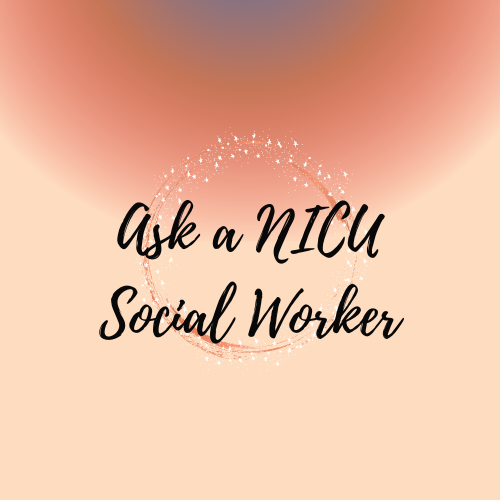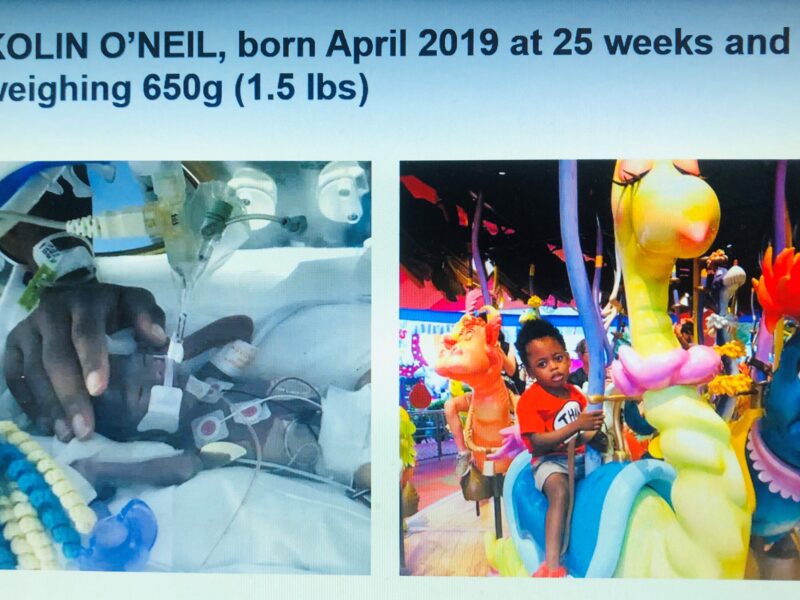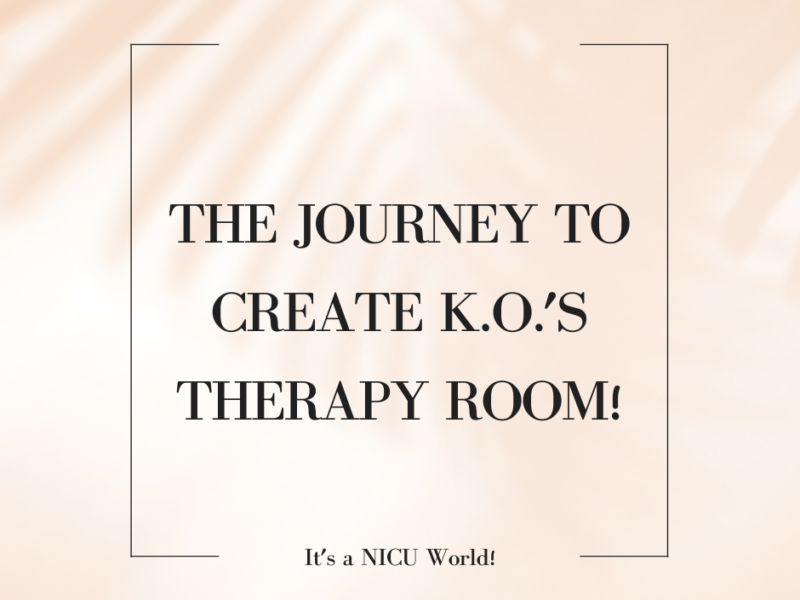
As a social worker for both the NICU and OB units, what does your typical day look like?
One of the things about working in a hospital is that it is a 24/7, 365 day/year deal! Whether you’re off for a day, the weekend or two weeks, there is no way to know or even anticipate, with any degree of certainty, what you will find upon your return. That being said, at the start of my day, I print my census so that I have my list of new admissions as well as a reminder of patients/families with whom I need to follow up. I typically go up to my units in the morning and again in the afternoon. My goal is to meet all of the NICU families as well as all of the maternity patients. I usually don’t meet with the Labor & Delivery patients until after they deliver unless a patient who is admitted to that unit needs to see the social worker more immediately. Sometimes patients will need to be on long term hospital bedrest, so I will try to meet them and let them know that I’m available to support them through the admission, perhaps checking in weekly if that would be helpful. A day might include providing resources, offering a listening ear, participating in a family meeting with the NICU team, seeing a patient in the OB GYN clinic, talking with the team about a patient/family issue, making and receiving phone calls (sometimes from patients/families who have been discharged) and ensuring that my documentation is completed. As the saying goes: if you don’t document it, it didn’t happen!
How do you mentally prepare for each shift?
To prepare for my day, I try to remind myself to stay in TODAY. I do pray for wisdom and discernment as well as focus, inspiration and problem-solving ability for whatever the day may bring. When it’s particularly stressful, I remind myself that the day will come to a close, even if we’re not there yet! I think about what tasks need to be completed today, and what can wait for tomorrow. Everything is not a priority, contrary to popular belief ? Lastly, I try to be on the lookout for the joy or the adventure in the day.
Does every baby in the NICU automatically receive a social worker consultation?
My goal is to meet with all of the NICU families, because having a baby in the NICU, whether for a few hours or for weeks or even months, is not what was dreamed of. Even when a family knows ahead of time, that the NICU will be part of their birth story, knowing something intellectually and living it emotionally, are not the same thing. I am neither physician nor nurse so my help will not be hands on with the baby…it will be about the family and how I can be present with and for them. There are occasions when the team will consult me for a particular reason, for example, when there is a history of substance abuse and a report may need to be made to Child Protective Services.
What do you enjoy most about your job?
I recently did a presentation on my work as a NICU social worker and I titled it, “A Welcoming Presence In a Strange Land” – it means a great deal to me to be able to accompany our families/patients on their journey. I am always humbled and amazed at the willingness of NICU parents, to allow a stranger to step into such a sacred and personal space. I love listening to people’s stories and at my core I am an encourager. My role in the NICU particularly, allows me to share that, because we sometimes have the privilege of working with our babies and families over a very extended period of time. I have been deeply moved and inspired by many of our NICU families ~ my life has been changed and I have grown both professionally and personally, through these encounters and through this work. I have had the opportunity to participate in the orientation of new social workers, nurses and chaplains and one of the things that I share is the importance of finding ways to make the position their own…ways in which their giftedness can be utilized. I love to write and I enjoy public speaking, so I have been open to opportunities to use those attributes even in the course of my day-to-day work.
What do you enjoy least about your job?
The social workers have to take turns being on call and that is hands down, the thing that I like the least! When you are on call, it is for the entire hospital and it is 24/7. We are not required to come in unless it is an extreme situation; however, it does mean that the pager is on until your on-call rotation is over. Because you can be paged about any patient in the hospital, including the ER, there will be many patient issues about which you know nothing. Additionally, because my units are more specialized, there are issues that come up in other parts of the hospital, that would never or only rarely come up in the world of my units. I must admit, that is stressful for me. This is the one thing that I would give up in a heartbeat! I would also add that sometimes, the need of others can be tiring, particularly when people are in already challenging situations and they make a decision to have a child or another child, and you wonder whether they have thought about the impact beyond their own desires. One last thought: patients/families who present with a sense of entitlement or an expectation that the social worker is supposed to solve all of their issues (even those that predated this circumstance)…I would have to say, that is not a good look!
How do you handle difficult cases?
I had a NICU dad ask me one day, how I come in and do this work every day. I told him that one thing that helps me is to know what is and what is not within my control and to be okay with that. If I try to address the situation with compassion and excellence, if I’ve tried to do my best, then whatever the outcome is, I need to try to find a way to allow it to be enough, to allow the good to stand. Our families/patients can also be our best teachers, if we let them. Taking the time to listen to them, to understand the place that they are speaking from and also, trying to reach for what is underneath the challenging behavior, can make all the difference. Other members of the multidisciplinary team can also be a great asset: they can bring additional perspectives as well as different ideas and strategies.
How do you help to determine what a baby’s needs may be after discharge?
As a member of the multidisciplinary team, I participate in weekly Discharge Rounds and am part of the conversation about what considerations and barriers may need to be addressed in order for the baby to be safely and appropriately discharged. I also continue to have conversations with the families throughout the babies’ hospital stay. Part of my role includes trying to identify family/community resources and supports that may help the family to successfully transition from the NICU to home. Practical considerations such as discussing a parent’s leave status, FMLA and/or providing them with a letter for their employer in support of their request for time off, are also part of my role.
What advice would you give to parents who are currently in the midst of their NICU journey?
The words that form the question perhaps speak to the heart of the matter…the NICU experience is a journey. Journeys, however long or short, have a beginning, a middle and an end. We don’t always know how the journey will unfold but as unfamiliar and as scary as it may be, you do enter the journey with some internal and some external resources. There is more strength and resilience in you, than you realize…trust that. The NICU is also a teacher. A very dear and wise friend once told me that unhappily, happiness teaches us very little (unless something has interrupted our happiness). The things that grow and deepen us, are the hard things, those things that we would never choose for ourselves. Allow the lessons of patience and perseverance and gratitude to do their work on your behalf. Don’t worry in silence and don’t be afraid/embarrassed to ask for help. Know that it is okay, not to know how to do this! Don’t let worry about tomorrow stop you from enjoying today’s successes and progress, however small. We can’t stop our thoughts from wondering about the future and pondering the what ifs, but don’t start paying rent in the future, come back to the present because that’s the only place that we can live. Even if a particular step/action cannot solve the problem or change the reality, that does not mean that it cannot make a positive difference. For example, giving you strength and encouragement to get up tomorrow and do it again. Where might your control lie in a circumstance where you may be feeling your most powerless? Choices that you get to make, even seemingly small choices, can empower. Hope is a very different kind of four-letter word! It is possible to hold the reality of the situation side by side with your hope for the situation. Both are real, both are true. Let the team know what we can do to help you to feel more welcome in this space. You don’t need me to tell you that the NICU experience does not occur in a vacuum, the rest of life continues to make demands. Perhaps we can help you to navigate some of those issues. Each of our parents, our families, are storytellers in their own right. They fill our hearts with their voices. Maybe last but certainly not least: believe the fact that you are a mom, you are a dad, to that baby, despite the fact that nurses may be providing much of the care and doctors may be making many of the decisions. Nothing can change the truth and the importance of your role ~
Is there anything else that you would like to share?
Final thoughts: I had no idea what NICU stood for when I was called to interview for the position…now, I will never forget it, no matter where the further adventures of Alison may take me. The NICU can be a life cycle interrupter, sometimes a dream breaker, but in other moments, a miracle maker. Our NICU families sometimes form deep connections with each other that will extend far beyond the NICU chapter! Every year hundreds of parents return (most recently virtually) for the NICU Reunion. It is equally true that the babies become ours in a meaningful way…parents spend so much time in this space and especially in this time of the Pandemic, the NICU team are the only other people who have met the baby face to face. The NICU is sometimes a forum for ethical dilemmas: when have we done all that we can, or should? There are moments when even the most sophisticated technology and the brightest minds and the best laid plans and deepest intentions…are not enough. The power and limitation of our words like the sides of a seesaw. But even in the face of what was not possible and did not work out, as members of the NICU team, we should never be afraid to show our humanity ~ that may be one of the actions that matters most and one of the memories that lingers the longest.


